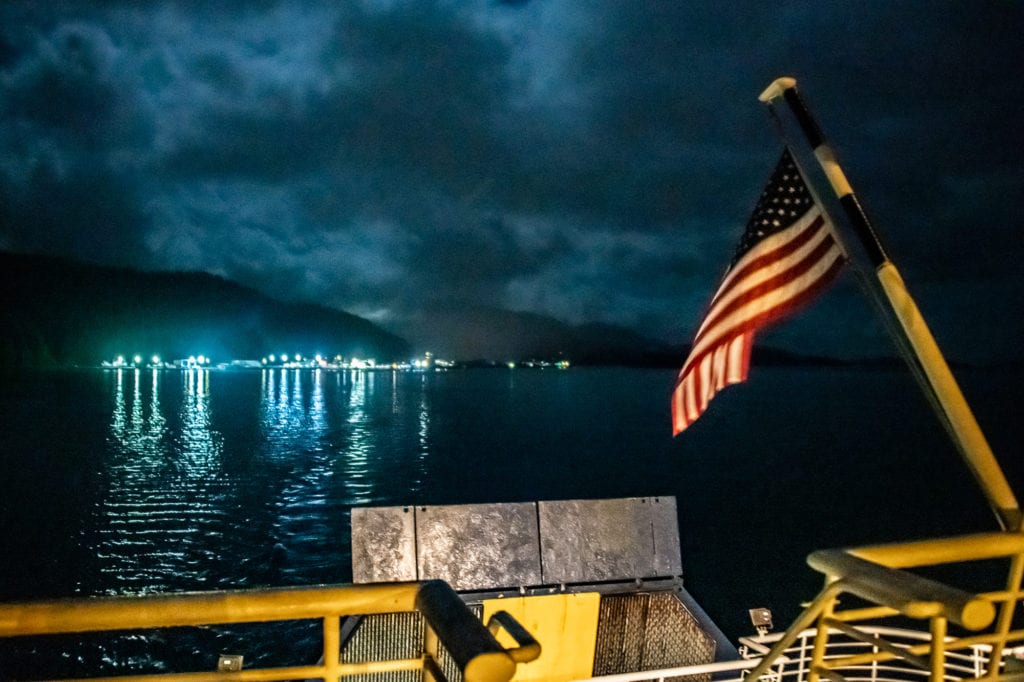
Rico Zapata peers from the stern of the ferry M/V Aurora. It’s the first time the Tennesseean sightseer has viewed the imposing peaks of the Chugach Mountains. It’s also the first time he’s traveled by ferry. In fact, it’s the first time he’s heard that the ferry on which he is now riding will abruptly terminate service tonight, not to return for seven months.
It takes Zapata roughly five seconds to draw an analysis of the situation: “I didn’t know this was the last one. It’s preposterous. It don’t make no sense, especially if it’s a way of life.”
When the ferry arrived in small-town Alaska, it was a tremendous novelty: a floating road connecting islands and fishing villages to the rest of the map. In 1963, Ketchikan residents created traffic jams just to get a look at the 408-foot vessel M/V Malaspina. The following year, Cordova and other roadless towns in the Prince William Sound region were linked to the state-run Alaska Marine Highway System.
“Something happened at that moment,” wrote Ketchikan resident Betty J. Marksheffel, quoted in an AMHS publication. “The feeling of isolation went away! – as I watched the ship coming up the channel. We could take our car, or walk onboard, and go somewhere! Our highway had arrived!”
Five decades later, the sudden closure of that highway to Prince William Sound has drawn an equally profound outburst. Over time, business in Cordova has grown more intertwined with the ferry service: fishing lodges rely on it to transport life rafts to Anchorage for maintenance, stores rely on it to acquire affordable produce, and schools rely on it to bring students to sports competitions. Whether Cordovans are feeding their children or vaccinating their pets, repairing cars or delivering babies, they have come to rely on the ferry.
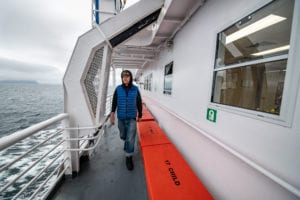
In 1964, five AMHS ferries transported 100,000 passengers and nearly 22,000 vehicles. In 2016, 11 ferries transported 319,000 passengers and 108,000 vehicles, according to a study by the McDowell Group. Though the ferry is not directly profitable, it produces an indirect economic return of around 2.3-to-1 by transporting tourists like Zapata and by allowing businesses to buy and sell goods without splurging on air shipping, according to the study. Additionally, in 2016, the AMHS accounted for $103.7 million in wages for Alaskans.
These figures might suggest that Alaska’s ferries were sailing on smooth waters. However, on Feb. 13, Gov. Mike Dunleavy unveiled a revised state budget including $97 million in cuts to the Alaska Department of Transportation and Public Facilities — a budget reduction of 38 percent. The cuts were necessary to address a $1.6-billion state deficit, Dunleavy said.
“We can’t continue to be all things for all people,” Dunleavy said at a news conference announcing the budget.
In April, the Alaska Senate Finance Committee approved a budget reducing DOT cuts from $97 million to $44 million, enough to restore some winter ferry service. However, a draft schedule released July 11 showed a gap in ferry service to Prince William Sound stretching from October to May — an unprecedented outage. A legislative attempt to restore an additional $5 million in funding, which might have provided some service during that period, was blocked by Dunleavy, with the scheduled outage just a month distant.
For many, Dunleavy has become the personification of Prince William Sound’s ferry problems and acquired a kind of negative cult of personality. Since July, Dunleavy has been the subject of a recall campaign alleging, among other things, that he illegally used state funds for partisan advertising. Foremost among Dunleavy’s critics is state Rep. Louise Stutes, R-Kodiak, chair of the House Transportation Committee.
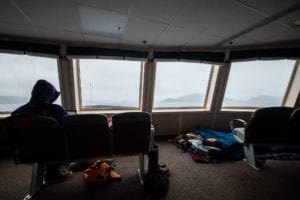
“I believe that Alaskans have had a clear view at what the administration’s vision for the state actually looks like and that, collectively, we have wholeheartedly rejected that vision,” wrote Stutes in a Sept. 4 open letter. “It is a vision of a lesser, depleted rural Alaska and it is something I oppose with every fiber of my being … Public opinion has firmly shifted away from the governor and his agenda, and I hope that, over time, this will continue to curb the governor away from the destructive course he has charted for Alaska.”
In the pre-dawn hours of Sept. 19, passengers filed into the Aurora under a light mist. Though, at 42, the Aurora is no longer a young ship, its interior is cozy and well kept up, with enough brochures, television screens and jigsaw puzzles to keep anyone distracted during the 11-hour trip from Cordova to Valdez. On this, its final run out of Cordova, the Aurora’s car deck is packed full, although there are roughly a dozen seats available to each passenger. The forward observation lounge is kept in a dozy red half-light, and several riders spread out sleeping bags beneath its windows. Riding aboard the Aurora is, at least, more comfortable than flying.
Ferry terminal workers farewell the vessel with blaring horns and a single red boat flare. Those passengers who don’t, or can’t, sleep keep up the familiar debate: have the protests and the petitions, in the end, accomplished anything? With only five months of ferry service per year, will Cordova deteriorate into a ghost town? Could the ferry service be privatized? And, above all, who is to blame?
Dunleavy, for his part, has dismissed the uproar as a mere expression of partisanship. At a Sept. 20 speech to supporters in Fairbanks, Dunleavy identified his critics as pandering journalists and left-wing activists who had gone berserk after the election of Donald Trump: “These guys — they go out and protest. They burn, they wreck restaurants, they attack people on the streets. They throw themselves on the ground. They start doing temper tantrums. They can’t accept the fact that, in this country, people may not want to be like them, so they go wild, is what happens.”
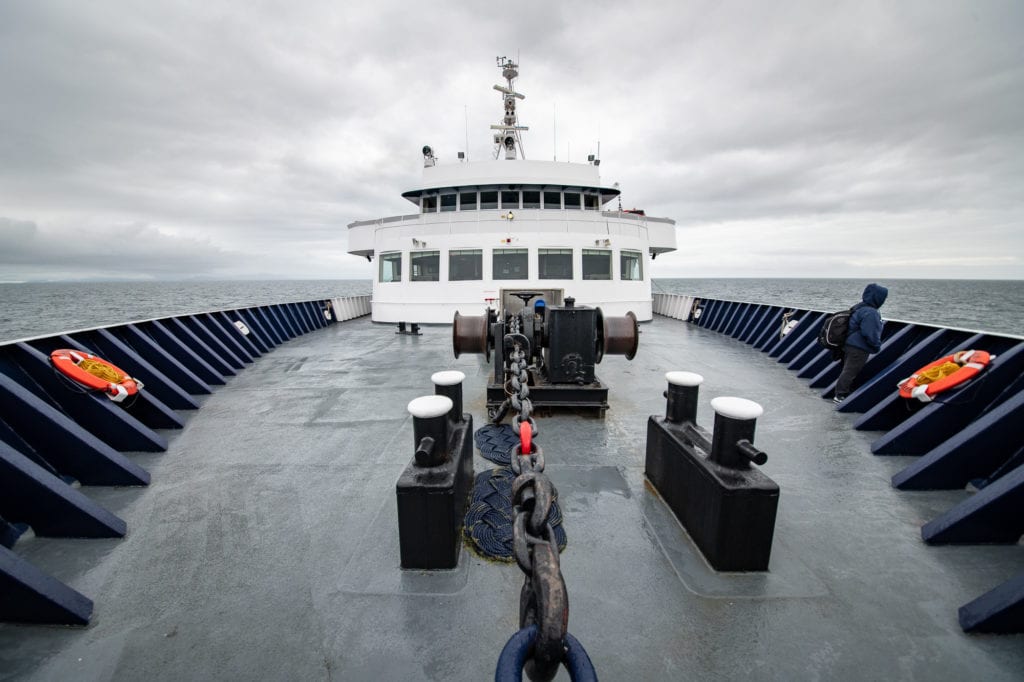
‘If Cordova would just disappear, it’d make a lot of people real happy.’
With an unruly mane of silver hair and palms callused by decades of hauling fishing nets, Phil Lian seems an unlikely restaurant-wrecker or tantrum-thrower. Nevertheless, the stoic former fisherman believes that recalling Dunleavy may be the first step to restoring regular ferry service to Prince William Sound.
“I’m upset,” says Lian, something that would not otherwise be apparent. “Dunleavy thinks the answer is to move everybody into the urban areas … ‘Move to the city! That’ll solve all your problems.’ A guy coming from wherever he came from doesn’t realize what Alaska is, even if he is the governor… If you want to live in a city, go to Chicago. Don’t come to Alaska.”
Though Lian no longer makes a living by fishing, he periodically returns to Cordova to drop in on relatives and to perform marine surveys. This year, he stayed as long as he could.
Now, Lian is squeezed into a booth in the Aurora’s sternside cafeteria alongside three other fishermen, who sip black coffee from paper cups and devour meat-lover’s omelettes with small plastic forks. They mull over solutions to the ferry problem. Should the system be privatized? Lian says no: even Alaska Airlines requires subsidies to serve Cordova.
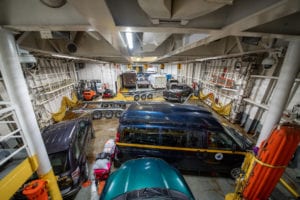
As unpalatable as Lian finds tax hikes, he believes that implementing a state income tax to re-fund the AMHS would be worth it — an uncomfortable necessity. The one thing these fishermen do not debate is who is responsible for the current debacle.
In these discussions, critics often cast Dunleavy as a kind of bumbling ogre who has half-unwittingly crushed Prince William Sound underfoot. Lian, however, speculates that Dunleavy’s cuts to the AMHS are part of a targeted attack against a town that has often pushed back against petroleum and sport-fishing companies.
“To me, it’s pretty obvious what [Dunleavy] thinks of Prince William Sound,” Lian says. “I’m speaking outside of what I probably should be saying, but — I think he’s got his marching orders. I know we’re a pain in the butt for the oil industry, and I think that recall petition didn’t set too well with him … We’ve made him mad, and now he’s going to throw a tissy and act like a little child. He’s throwing a temper tantrum, and I’d say that right to his face, too.”
Lian may be a fatalist, but he is not a pessimist: Cordova, he points out, has had its share of near-Biblical disasters: the 1963 fire that leveled Main Street; the Good Friday earthquake that, in 1964, devastated parts of Prince William Sound and Southcentral Alaska; and, of course, the 1989 Exxon Valdez spill that spread crude oil across 1,300 miles of coastline.
“If Cordova would just disappear, it’d make a lot of people real happy,” Lian says. “But it isn’t gonna happen. Cordova’s been through a lot. We’re survivors.”
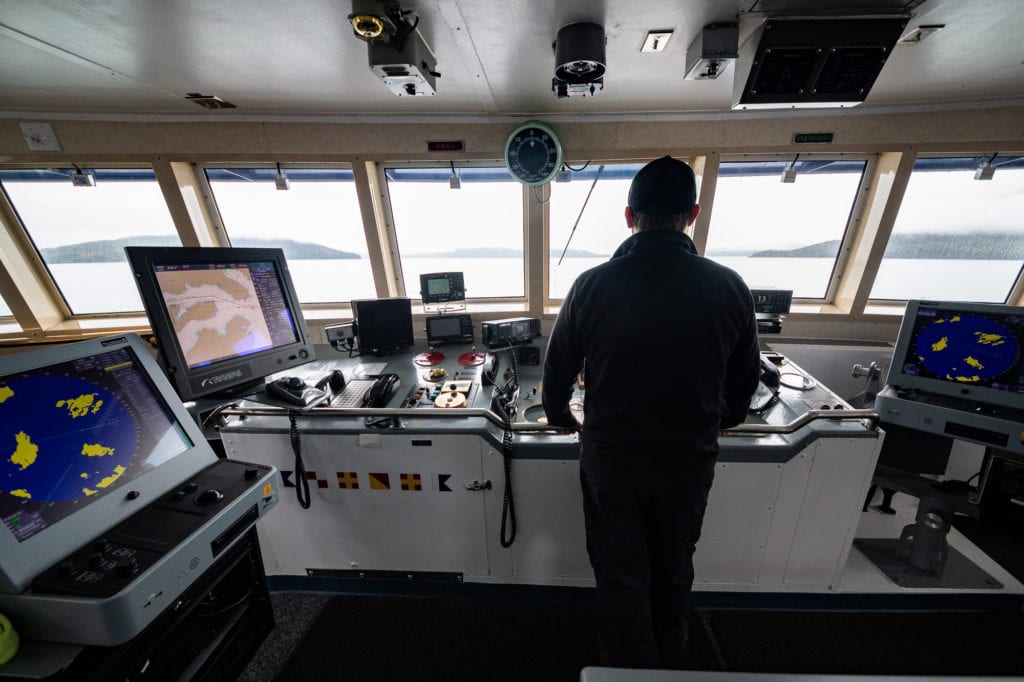
‘Do we have to crash and burn so that the phoenix can rise out of the ashes?’
Perhaps the only person on board who doesn’t wish to see Dunleavy walk the plank is Cynthia Clark, the ship’s mess steward. A veteran of the catering industry, Clark monitors every detail of the Aurora’s kitchen and cafeteria, right down to the level of salt in the shakers. With a cheery domesticity that betrays her brazenly critical outlook on the world, Clark is capable of doing her job while also delivering a running diagnosis of the ferry system’s problems.
“I, personally, have nothing against Dunleavy,” Clark says. “I’m not on the recall effort. He was handed a bill of goods that was basically crap … System-wide, it’s waste, fraud and abuse — it’s government.”
To call Clark detail-oriented would be inadequate: preparing the crew mess, she distributes utensils and paper napkins across the tables with surprising speed and in perfect alignment. Rarely has the mess been less messy.
According to Clark, Prince William Sound’s ferry service is being torn apart amidst a giant scrum between inept AMHS administrators, shortsighted legislators, lobbyists and “international bankers.” The compulsively outspoken Clark quickly paints a picture of a ferry service in decline, undermined by poor communication from shoreside bosses and friction between engineers who dislike sharing information with one another. A bureaucratic structure, entangling any potential innovation in layer upon layer of protocol, has been unable to meet the changing demands placed upon it, she says.
“The ferry has been in a nosedive for a long time,” Clark says. “It’s a disconnect between shoreside and shipside. We have very talented people that work on these boats, in all different departments … It’s a broken institutional mentality, and it’s on this ferry, too. We’re not all perfect little bees. People that are lifers just go along to get along and, oh my gosh, if you have any new ideas, you’re rocking the boat.”
Clark has spent up to four and a half months at a time aboard vessels like the Aurora, saving as much as possible. Whatever she ends up doing after leaving the AMHS, Clark knows it won’t be another government job.
“It didn’t start with Mr. Dunleavy,” Clark says. “People are always looking for a target to blame. The state’s problems were highly boiling at the point before he came on. This system has been in place for many, many years, and now we’re witnessing the complete and utter breakdown of that system … Do we have to crash and burn so that the phoenix can rise out of the ashes?”
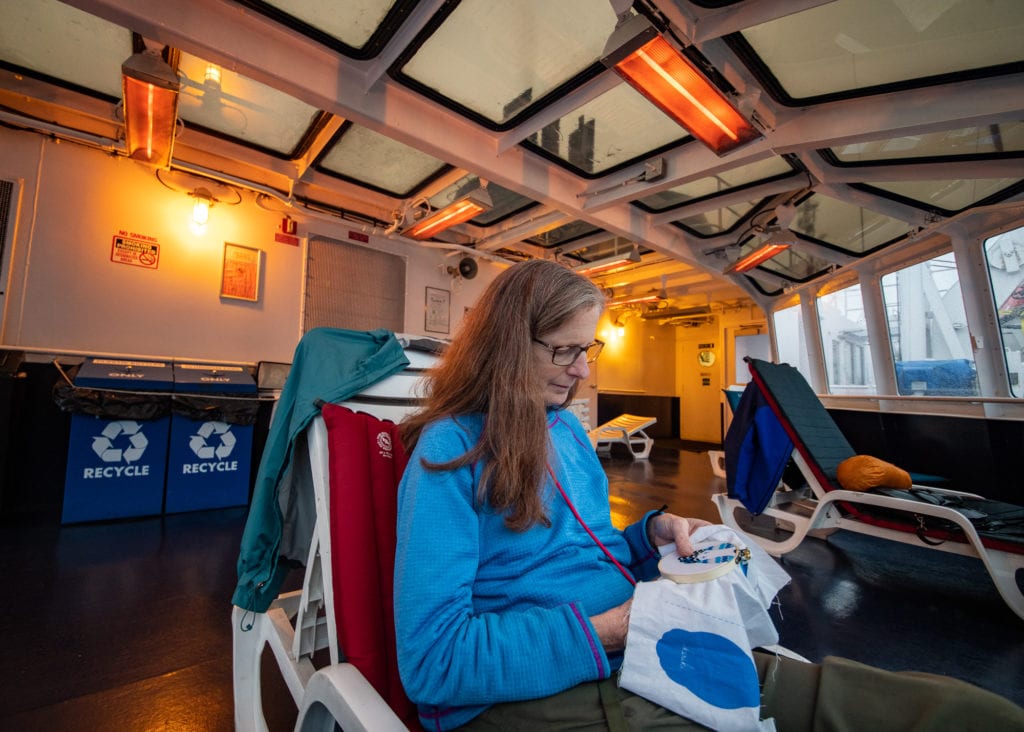
‘We are owed a response from the state.’
Reclining beneath the heat lamps in the Aurora’s upper-deck solarium as she works on a piece of embroidery, Cordova resident Torie Baker may seem relaxed, even meditative — but she isn’t. Baker is returning from an Anchorage optometry clinic, a visit enabled by a one-week extension of ferry service. Baker doesn’t just believe that future ferry outages can be prevented: she believes that this one can as well.
“This is a very significant event, and there is an air of sadness that you’re picking up on, but I know a lot of people are working very diligently for solutions for this winter,” Baker says. “Not for next year, not for the next cycle — we need this this winter.”
Baker believes that, despite Dunleavy’s claims of nonchalance, he will not be able to ignore the issue forever. There will be hope as long as residents continue to apply pressure by protesting and by advocating for solutions like staggering ship repair times.
The town of Cordova has taken every avenue short of sabotage to voice its displeasure with the prospect of a winter without a ferry. A July 27 meeting of the Alaska House Transportation Committee in Cordova drew 250 residents, more than one-tenth of the town’s population. There, students and retirees, fishermen and ex-mayors, vegans and NRA members lined up to enumerate the risks posed by a long-term ferry stoppage. At the time, few imagined that such a gesture would go ignored.
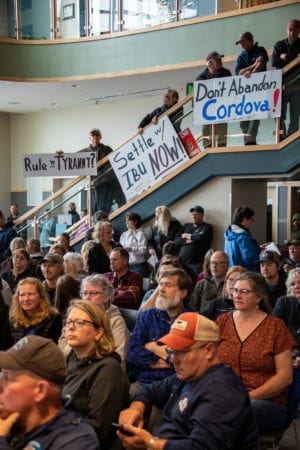
Cordova has had no more dedicated advocate for working within the system than Mayor Clay Koplin. While legislators like Stutes bluntly denounced Dunleavy’s cuts as “inconceivable,” Koplin maintained a non-confrontational tone, thanking the state for a week-long service extension and refusing to launch explicit attacks on Dunleavy, regardless of how much public approval it might have won. It wasn’t until Sept. 18, when it was clear that no further extension would be granted, that Koplin allowed the dam to rupture:
“The future sustainability of the Alaska Marine Highway System (AMHS) is best achieved by reducing operating costs, growing revenues, and improving customer experience,” wrote Koplin in a public letter. “We grow weary of repeating this admonition. Nearly every legislature and administration have collectively violated this basic service model to varying degrees. None have failed as completely as the current administration or caused as much harm to the strong and growing economy of Cordova, Alaska and coastal Alaskan communities like her … We urgently request the immediate partnership and support of Cordova’s internal and external business partners, peer communities, Federal delegation and partners, and, most importantly, the State of Alaska’s Governor and AMHS management staff to support immediate reversal of this destructive and irresponsible closure of Cordova’s primary transportation mode this winter.”
As Cordova readies itself for a return to pre-1964 isolation, residents continue to debate diagnoses and treatments for the problem. If one point is agreed upon, it is that things cannot remain as they are.
“We are owed a response from the state,” Baker says. “I know some people are resigned, but we’re not resigned. That’s not what Cordova’s about.”
Zachary Snowdon Smith is a reporter and photographer for The Cordova Times. Reach him at zsmith@thecordovatimes.com.





